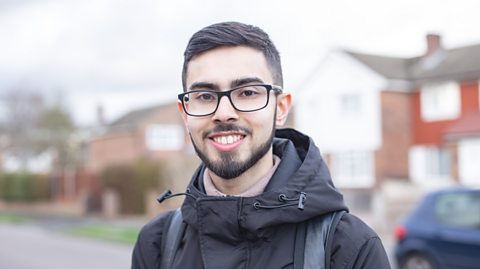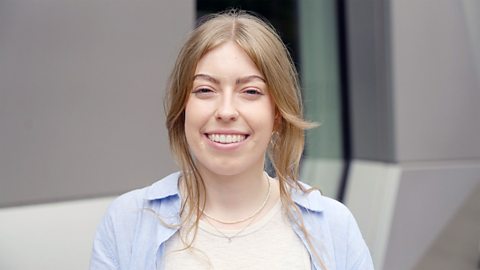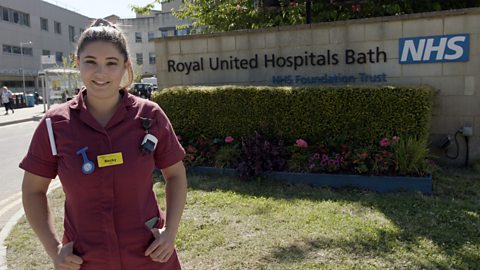Meet Hari, 29, a trainee clinical psychologist with Mersey Care NHS Foundation Trust in Liverpool. Find out more about his job and journey into the role.
Part of our Bitesize world of work series.
I love my job because I find people fascinating and I get to help them in a caring way.
Hari:
My name is Hari. I'm a trainee clinical psychologist and I love my job because I find people fascinating and I get to help them in a caring way.
So, I'm currently working in a community mental health team. That requires me working with adults that come along with various degrees of psychological distress, so things like anxiety, depression, stress.
So, usually, my day to day looks at working with a case load of clients. It could involve me attending meetings, carrying out one to one therapy work, writing reports. Definitely writing notes.
As part of the doctorate in clinical psychology, I've got to go on placements to make sure that I can work psychologically and therapeutically across the lifespan of people. What that means is that I've worked in adult mental health in older adults, I've worked with children.
(to employees) I wondered if you guys could help with providing any other suggestions?
If I remember back to that time of GCSEs, I was terribly stressed and worried, but I didn't get good grades by the end of it. Even if things don't work out so well in that moment, this too shall pass.
Mike, supervisor:
It's really enjoyable working with Hari, because he is so passionate and dynamic and is so committed to the clinical work.
Hari:
You've got to be able to listen and talk to people. In addition to that, it's not a robotic communication, it's empathic one. So, can you really put yourself in other people's shoes and see another person's world whilst living your own.
To be a good clinical psychologist means to be a good listener and communicator. In addition to that, I think it's all about wanting to learn, wanting to progress on that learning. All of those skills are quite unique, but they add to what I then bring to clinical psychology, or even to the training programme.
What I love about my job of being a trainee clinical psychologist is that we're in a great position to affect change. That change is done on behalf of the clients, so the people that we see and the people that we work with, and we can really put them in the forefront of, right at the front of everything that we do.
Be prepared to study hard, because it will be well worth it in the end.
- Hari is training to become a clinical psychologist on a three year postgraduate Doctorate in Clinical Psychology programme at the University of Liverpool. When he completes his course, he will be a fully qualified clinical psychologist.
- Hari splits his time between attending teaching, professional research and clinical work placements with the NHS.
- A big part of Hari's job is talking to, listening and understanding people, and supporting them to manage a wide range of mental or physical health problems.
- The main skills and attributes Hari uses in his role are communication, interpersonal skills, empathy, and being open to learning new ideas.
- As part of the trainee programme, he works closely with a senior clinical psychologist mentor and supervisor to develop his skills.
- At school, English helped Hari develop communication skills, and Maths and Biology gave him an understanding of statistics and scientific research.
- At A-level, Hari studied Psychology and Sociology which helped him understand how people think and behave.
- Hari found out that clinical psychology was a career option during his degree in Psychology and Criminology. He then went on to complete a masters degree in Forensic and Criminological Psychology.
- During Hari's studies, he volunteered and worked as a healthcare assistant in hospitals to get relevant experience.

Top tips
- Determination and commitment is needed to become a clinical psychologist. Stick with it and it'll be worth it in the end.
- Be prepared to study hard and be patient. You need to complete an accredited undergraduate degree.
- Learn to be comfortable being yourself. This is the foundation to becoming a great clinical psychologist.

Hari's training programme is a full-time role paid for by the NHS at band 6. When he qualifies, he will progress to band 7 and can practice as a clinical psychologist within the NHS. He can decide to specialise in an area of work and apply for clinical psychologist jobs, either in the NHS or in the private sector.
What to expect if you want to be a clinical psychologist
- Clinical psychologist average salary: NHS bands 6-9. Read more about NHS bands. Salaries will differ in private healthcare.
- Clinical psychologist typical working hours: 35 to 40 hours or more per week.
What qualifications do you need to be a clinical psychologist?
You could get into this role via a university course or an apprenticeship. You'll need a 2:1 degree in psychology accredited by The British Psychological Society. If you have a degree in a subject other than psychology, you can apply for an accredited conversion course. After your first degree, you'll need a postgraduate doctorate in clinical psychology. You could do a clinical associate in psychology degree apprenticeship and then apply for graduate membership before you can apply for jobs as a clinical psychologist.
_Sources: LMI for All, National Careers Service, _
This information is a guide and is constantly changing. Please check the National Careers Service website and the NHS Health Careers website for the latest information and all the qualifications needed.
For careers advice in all parts of the UK visit: National Careers Service (England), nidirect (Northern Ireland), My World of Work (Scotland) and Careers Wales (Wales).

Omar: social worker. video
Omar is a social worker working with children and families for a local authority.

Poppy: public health officer. video
Poppy is a public health official for a local authority in London.

Becky: healthcare assistant. video
Becky is a healthcare assistant at Royal United Hospitals Bath.
